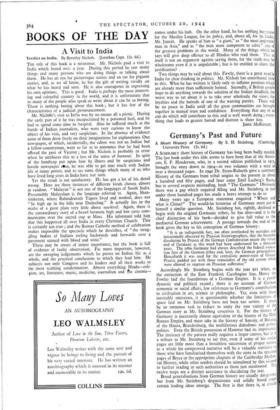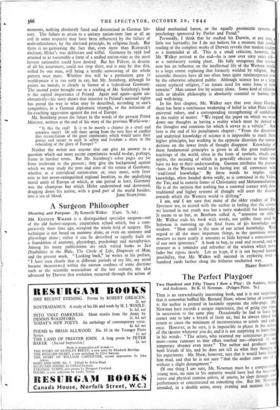Germany's Past and Future
A Short History of Germany. By S. H. Steinberg. (Cambridge University Press. 12s. 6d.) A SCHOLARLY short history of Germany has long been badly needed. The last book under this title seems to have been that of the Ameri- can, E. F. Henderson, who, in a second edition published in 1923, brought the story down to 1914—in two volumes with a total of over a thousand pages. In 1940 Dr. Stern-Rubarth gave a summary History of the Germans from tribal origins to the present in about a hundred and fifty pages, and later came .Emil Ludwig's fluent, but in several respects misleading, book " The Germans." Obviously there was a gap which required filling and Mr. Steinberg in just under three hundred pages has made a brave attempt to do so Many years ago a European statesman enquired " Where and what ii China?" The would-be historian of Germany must put to himself a similar question. Mr. Steinberg has, rightly, declined to begin with the original Germanic tribes; he has also—and it is the chief distinction of his book—decided to give full value to the mediaeval German achievement. A passage towards the end of his book gives the key to his conception of German history : " It is an indisputable fact, too often overlooked by outsiders and intentionally obscured by Prussian historiographers, that the forceable dissolution by Prussia of the German Confederation meant the virtual end of Germany as this word had been understood for a thousand years. The teem Germany had always described the federal associa- tion first of the German tribes and, later, the German principalities. Henceforth it was used for the centralistic power-state of Greater Prussia padded out with those remainders of the old system which were allowed to vegetate on Prussian sufferance."
Accordingly Mr. Steinberg begins with the year 911 when, on the extinction of the East Frankish Carolingian line, Henry the Fowler laid the foundations of a German Empire. It is a purely dynastic and political record ; there is no account of German economic or social affairs, few references to Germany's contributions to civilisation in art, science or philosophy. Yet, even with these inevitable omissions, it is questionable whether the limitations of space laid on Mr. Steinberg have not been too severe. It must be an immense task to reduce to unity the vast variety of the German story as Mr. Steinberg conceives it. For the history of Germany is necessarily almost equivalent td the history of the Holy Roman Empire, and must take in the history of Saxony, of Bavaria, of the Hansa, Brandenburg, the multifarious dukedoms and princi- palities. Even the British possession of Hanover had its importance. The intricacy of the pattern really requires a larger canvas, but itts a tribute to Mr. Steinberg to say that, even if some of his earlier pages are little more than a breathless succession of proper names, as a whole his compressed narrative will be a valuable reminder to those who have familiarised themselves with the story in the spacious pages of Bryce or the appropriate chapters of the Cambridge Mediae- val History, while other readers should be stimulated by this resume to further reading in such authorities as those just mentioned. The twelve maps are a distinct assistance in elucidating the text.
Broad generalisations from German history are usually dargerous, but from Mr. Steinberg's dispassionate and solidly based pages certain leading ideas emerge. The first is that there is, at crucial moments, nothing absolutely fated and determined in German his- tory. The failure to attain to a unitary nation-state (not at all an evil in some respects) may have been influenced by the failure of male-inheritance, by the electoral principle, by religious feuds. But there is no gainsaying the fact that, even more than Bismarck's decision, Hitler's was deliberate and wilful. Germany by 1938 had attained to as reasonable a form of a unified nation-state as the most fervent nationalist could have desired. But her Fiihrer, in despite of all his assurances, could not stop short, and it may be that this, willed by one man, will bring a terrific runweaving of the whole pattern once more. Whether this will be a permanent gain to world-peace it is too early to say, but Mr. Steinberg, although he points no morals, is clearly in favour of a federalised Germany. The second point brought out in a reading of Mr. Steinberg's book is the capital importance of Poland. Again and again—quite un- obtrusively—his story shows that injustice to Poland's national rights has paved the way to what may be described, according to one's sympathies, as a German diplomatic triumph, or the initiation of far-reaching aggression against the rest of Europe.
Mr. Steinberg poses the future in the words of the present Prime Minister, written at the end of his story of the previous World-war : " Is this the end? Is it to be merely a chapter in a cruel and senseless story? Or will there spring from the very fires of conflict that reconciliation of the giant combatants which would unite their genius and secure to each in safety and freedom a share in the rebuilding of the glory of Europe?
Neither the writer nor anyone else can give an answer to a question which our more recent experiences would to-day, perhaps, frame in harsher terms. But Mr. Steinberg's sober pages are far from irrelevant to the present ; they give the background against which we may study the pros and cons of the return of Germany, whether as a centralised nation-state or, once more, with freer rein to her never-extinguished regional loyalties, to the underlying moral unity of Europe of which, at one period at least, Germany was the champion but which Hitler undermined and destroyed, dragging down his nation, with a good part of the world besides,



























 Previous page
Previous page